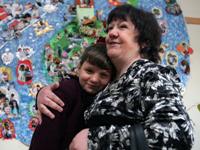Registration
You will receive an email confirming your registration.
IMGXYZ2619IMGZYXThe institution of parenthood is undergoing a transformation in Russia today. The attitudes of the state and society towards children are being rethought. Parents, bypassing the state and cooperating independently amongst themselves, are quietly helping to undermine statist paternalism. The Moscow Humanitarian Pedagogical Institute (MHPI) hosted a roundtable discussion on the “new parenthood” around the most recent issue of Pro et Contra dedicated to this topic.
The roundtable was organized by the Carnegie Moscow Center’s Pro et Contra and MHPI, as well as the MHPI Research Center on Child Development and Health Maintenance Activities in Education and the Sodeistviye methodical department for social integration of children not under their parents’ guardianship at MHPI. It was moderated by historian of culture Maria Mayofis of the Institute for the Advanced Studies in the Humanities at the Russian State University for the Humanities, one of the compilers of the Pro et Contra selection of articles on “new parenthood” and coauthor of the introductory article.
A Topical Subject
The social and political dimensions of parenthood are an important topic in modern Russia, explained Maria Lipman, editor-in-chief of Pro et Contra. It fits within the context of a public discourse on how political and social trends are shaped outside the traditional political spheres of public administration, local government, and political parties.
Parenthood has become a particularly important subject for the media, including in state-dominated television, said MHPI and Higher School of Economics sociologist of culture and literary critic Ilya Kukulin, one of the compilers of the “new parenthood” selection and coauthor of the introductory article. This can be seen in the news reports on foreign adoption of Russian children, for example, or the discussions sparked by the scandalous television series “School.” These issues are constantly being discussed also by the political and cultural elite. In Kukulin’s view, this shows that the real subject of discussion is adults themselves, who are starting to rethink the way they see their own and others’ children (and children from children’s homes, for example) and themselves too.
Children and Their Parents in Children’s Literature
Sodeistviye’s Ekaterina Asonova, the author of one of the articles, family consultant and specialist on family education issue, argued that modern children’s literature is in the process of forming a new image of child-parent relations. This new depiction implies a different, deeper, and in some ways less comfortable level of reflection for adults (for example, sometimes they are forced to acknowledge that they are unfair towards their children).
It is significant that this new model being depicted in children’s literature is proposed not only for non-working women who have the time for lengthy reflection and unhurried conversations with children, but for all parents.
Orphaned Children with Development Problems
At the same time, the role for orphans or children with disabilities in Russian society is still unclear. Orphaned children with development problems mostly live in children’s homes, isolated from the rest of society.
- “State Children”: Sociologist Alexey Levinson of the Levada Center, the author of an article on this subject in the Pro et Contra issue, written together with Svetlana Korolyova of the Levada Center, described orphaned children entering these children’s homes as “state children.” However, Levinson expressed concern that no one is able to articulate a clear explanation of just why the state should provide for and oversee these children, whereas there are more minuses than pluses in keeping children in children’s homes.
- Problems with Adoption: Discussion on how to integrate children with problems and disabilities into society is only just beginning in Russia, Levinson said. There is no institution of social workers who could help to support birth or foster families in raising these children. Adoption of these children usually follows one of three scenarios: adoption by foreigners, adoption by the families of junior medical staff in the children’s homes, or adoption by relatives (usually a very difficult process requiring great effort on the part of children’s home workers). Cases of these children being adopted by “ordinary” and unrelated Russian families in a good social situation are extremely rare. This is mostly linked to the particular nature of Russian society, Levinson argued, in which life for the parents of children with disabilities is very difficult.
Transformations Not for All?
Concluding the event, human rights activist Boris Altshuler of the NGO Right of Child agreed with the authors of Pro et Contra that the attitudes of adults towards children have changed rapidly over the last 20 years in Russia. However, he expressed doubts that the transformations analyzed in the articles affect a broad section of society. The attitudes of both the state and society towards children in Russia today should be seen as a cause for alarm, he argued. In particular, he cited the lack of school education on family and marriage issues as a matter of special concern. This lack of education has direct ties to the high number of abortions among minors in Russia, as compared to developed countries.
